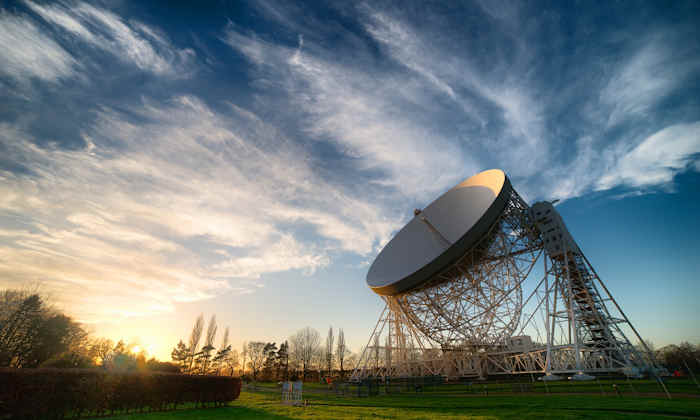Jodrell Bank Observatory added to UNESCO World Heritage List
08 Jul 2019
Our home of the iconic Lovell Telescope is UK’s newest UNESCO World Heritage Site

Jodrell Bank Observatory in Cheshire has been added to the UNESCO World Heritage List.
The observatory is the UK’s 32nd site to be added to the prestigious list, which includes Machu Picchu, the Great Wall of China and the Taj Mahal; its new status recognises Jodrell Bank’s role in transforming our understanding of the Universe.
Jodrell Bank, owned by the University, is famous as the home of the Lovell Telescope, the world’s third largest steerable radio telescope. Completed in 1957, the dish was the largest of its kind anywhere in the world until 1973 and was the catalyst for the construction of many other large scale satellite dishes.
The Lovell Telescope’s first act was to track the Soviet Union’s Sputnik, the world’s first artificial satellite. Today, Jodrell operates the UK’s national e-MERLIN radio telescope and hosts the global headquarters of the Square Kilometre Array, a radio telescope project that will build the world’s largest telescope, comprised of a network of instruments sited in South Africa and Australia.
The addition of Jodrell Bank to the UNESCO World Heritage List is in recognition of its outstanding scientific heritage including its pioneering role in the development of radio astronomy and its work in tracking spacecraft in the early space race, and its research into quasars, pulsars and gravitational lenses. The site has evidence of every stage of the history of radio astronomy, from its emergence as a new science in the 1940s through to the present day.
Our President and Vice-Chancellor, Professor Dame Nancy Rothwell, said: “I’m absolutely delighted to hear that the Jodrell Bank Observatory site has been assigned World Heritage status by UNESCO. This is fitting recognition of the history of science and discovery at Jodrell Bank, and the work that continues today.”
Jodrell Bank also hosted the inauguration ceremony of the new SKA Global Headquarters (SKA GHQ) this week. The facility is home to the intergovernmental organisation created to facilitate global collaboration in radio astronomy, which will be the international focal point for radio astronomy for the next 50 years.
